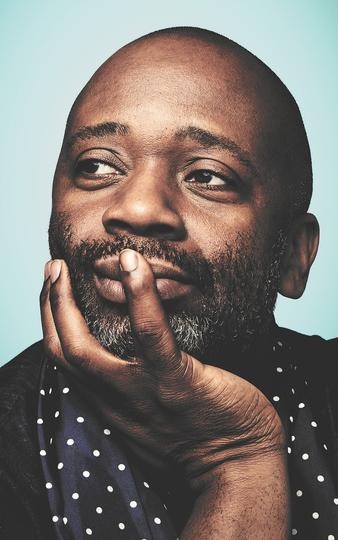“Love, Administration, Iteration.” This is the Holy Trinity of ingredients for the stew of our future, according to Theaster Gates. Chicago artist, urban planner, and craftsman, Gates is founder of the Rebuild Foundation and responsible for revitalization projects that engage communities and promote the celebration of art and culture grounded in investment and advocacy. On the stage of the Cindy Pritzker Auditorium at the Harold Washington Library Center, Gates and Dr. Adam Green, associate professor of history at the University of Chicago, discussed the importance of developing safe spaces to create and to experience. Green observed in Gates’s work common themes of generosity, practicality, and speculation; the mirepoix at the base of a meal meant as food pro multis.
The Chicago Public Library is planning to donate 1 million books to Gates to not only preserve and display, but also make available for patrons who want access to knowledge. This is not the first major donation he has received for archival. The Johnson Publishing Corporation donated more than 15,000 nonfiction and fiction books, and magazines, including a historical Ebony Magazine collection. Pulping books is a cringeworthy act in Gates’s eyes and he would rather see the books live a second life in the massive library and reading room of the Arts Bank. Acquiring a wealth of literature to simply make it available to everyone for free…
Generosity.
A potter by trade, Gates often sat at his wheel “with mounds of clay trying stuff.” His art ultimately evolved and became intertwined with property and shaping communities. He became the man sitting with architects and developers “trying stuff,” turning eyesore buildings on his block into beautiful bodies that both house and behave as art–what he calls the Dorchester Projects. Green asked when the concept of reuse became an integral part of the artistic process. Gates suggested it began at home: “It’s probably about survival.” His mother kept a plastic bag full of plastic bags to reuse (a comment often made in jest as a practice of black families). He also cites the use of take-out food containers that were washed and then reused to take lunch to work the next day…in a plastic bag. It begins with making use of a thing and then recognizing that thing as having potential or value in another capacity.
Practicality.
As the evening wound down, the conversation took an important yet morbid turn into the realm of police brutality and inner city violence. Gates minces no words when it comes to his responsibility to the black community. So much so that he has coordinated another unorthodox project. The gazebo where Trayvon Martin was shot and killed in Cleveland was dismantled earlier this year to be transported to Chicago. When Green inquired why this artifact is important to preserve, Gates was clear in his response. The gazebo is unequivocally a “black object” and is a site of black trauma. Once erected in what Gates lovingly refers to as “Kenwood Gardens,” an artist compound in-the-making, full of living and workspaces, the gazebo will act as a tangible place to mourn; to freely weep. It becomes a piece of art, a piece of history, and a gathering place to release pain and reflect and consider the future as a community.
Speculation.
Theaster Gates is Chicago’s neighborhood chef. One of his first endeavors after gaining an amount of success was to have a dinner, not unlike his mother’s Sunday gatherings. Only his dinners would be with gatekeepers and people with access to resources on a grand scale. He would then arrange another meal with community members with the drive “to get things done,” the goal being to share information across the table: knowledge served family style. He does not want singular success or to be elevated to the point of becoming a gatekeeper himself, but rather to provide the keys.
Gates name-checked Mayor Rahm Emmanuel once he arrived, acknowledging the dinner following the artist talk, but Gates also knew he would have to eat again. He realized some time ago, in order for people to get things done, they’d have to have two dinners.
bon appétit
Be good.
Chicago-based artist Theaster Gates has developed an expanded practice that includes space development, object making, performance and critical engagement with many publics. Founder of the non-profit Rebuild Foundation, Gates is currently a professor in the Department of Visual Art and director of Arts and Public Life at the University of Chicago.

